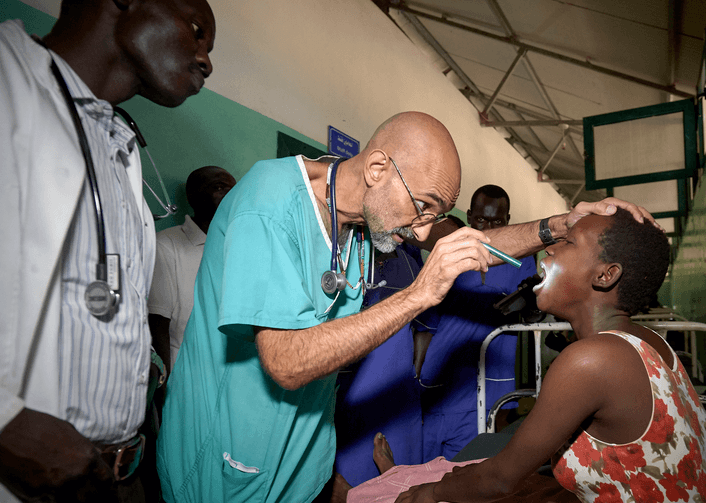This Doctor is Helping Those on the Margins in Sudan’s Nuba Mountains

Dr. Tom Catena is one of our longest serving volunteers, serving in the Nuba Mountains of Sudan. This piece was originally published in the June 10, 2019 issue of America, the Jesuit Review. In it, Dr. Tom Catena reflects on the life-changing impact of a decision he made years ago to stay in Sudan when war broke out.
In June 2011, violence erupted in Sudan’s remote Nuba Mountains, an area where I had lived and worked as the sole doctor and surgeon for three years. As our situation became increasingly precarious, I was advised by my sponsoring mission to evacuate and return to the United States.
The few religious sisters and priests serving in the region and I did not leave, however, and eight years later, we are still here, despite the violence.
These past eight years have been tremendously difficult. We have taken in thousands of wounded soldiers and civilians, sometimes more than 100 at a time; our hospital has been bombed twice; and the surrounding villages have been bombed on several occasions. Along with the usual seasonal outbreaks of malaria, pneumonia and diarrheal diseases, a major measles epidemic resulted in the death of 30 small children. For months, our wards have housed 450 to 500 patients at a time, all of whom required a high level of care. We tend to our patients mostly with staff who have been trained on the job.
This decision was my “come to Jesus” moment.
My decision to stay and take care of these people was a very simple one: If I left, many men, women and children would certainly die. This decision was my “come to Jesus” moment. I felt that if I left, that would mean that I valued my life over the lives of the people I came to serve. Why do the sisters, priests and I stay and continue to work and live in this difficult environment? We stay simply because we are missionaries and are there to show the love of Christ to his beleaguered children. We stay because we take Christ at his word when he commands us to take care of the “least of these.” These are not mere niceties but actual marching orders.
In our line of work, we witness daily a good share of suffering and pain. It is difficult to keep our spirits up when children are maimed, burned and killed by the effects of an aerial assault by a genocidal regime. On one such occasion, we had to watch three children die because of extensive burns from artillery shelling. On another, we had to amputate both the arms of a boy who was hit by a barrel bomb dropped from 20,000 feet. Another boy had his right arm and leg amputated after a separate bombardment. Many young soldiers have died after we perform prolonged and seemingly successful operations.
We are called to a life of humble service and radical reliance on God but not to perfection.
How can we continue? How do we avoid becoming paralyzed by grief?
Our Catholic faith teaches us that we are not the authors of life and death and that in humility we have to accept that it is not us but our good Lord who gives and sustains life. The people in the Nuba Mountains have an innate sense of the divine that we who live in peaceful, prosperous countries seem to have lost because of our reliance on our own erudition and technology. We are called to a life of humble service and radical reliance on God but not to perfection. We are to allow the immense grace of God to work in our lives. This can be accomplished only when we align our wills with the will of our loving Father.
I recently returned to the United States for a brief visit. I found this trip home unsettling and bewildering: the noise, traffic, Uber, Facebook, Twitter, too much food, spectacular wealth alongside homelessness. I felt the need to get back to the Nuba Mountains and my simple life of service. While in the United States, I talked to students who asked me how to find meaning in life and to live life to its fullest. Jesus gave the best answer to this question: “Go and sell all you own, pick up your cross, and follow me.”
Please note that the work was reprinted from America June 10, 2019 with permission of America Press, Inc., 2019. All rights reserved. For subscription information, call 1-800-627-9533 or visit americamagazine.org. Please note America does not permit to publish articles on any websites, blogs, social media and etc.